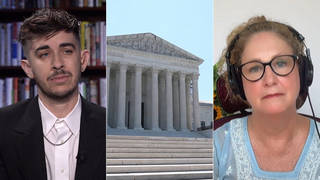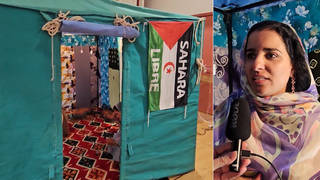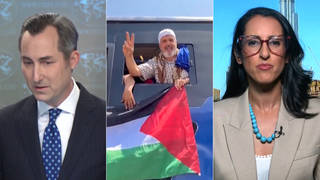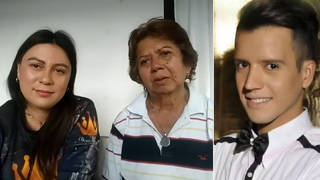
Topics
Guests
- Hossam BahgatEgyptian human rights activist and the founder and executive director of the Egyptian Initiative for Personal Rights.
The White House has announced it will suspend some of its $1.5 billion in annual military aid to Egypt until the country ushers in a democratic government. Reuters reports that some of the items to be withheld include Abrams tanks, F-16 aircraft, Apache helicopters and Harpoon missiles. The United States has avoided the automatic suspension of all military aid to Egypt by refusing to deem Mohamed Morsi’s ouster a coup. Hundreds of Morsi supporters have been killed by state forces since his ouster in July. Egypt, meanwhile, has set a date of November 4 for Morsi to stand trial for inciting the murder of protesters. “We believe Morsi should be prosecuted. He should be held accountable for crimes that he authored during his one year in office,” says Hossam Bahgat, founder and executive director of the Egyptian Initiative for Personal Rights. “But the kinds of prosecutions we are seeing are completely selective and punitive. It makes no sense to see Morsi being prosecuted for having incited the killing of 10 protesters when 1,000 protesters were killed on August 14 and there isn’t even an investigation into it.”
Transcript
JUAN GONZÁLEZ: The White House has announced that it will suspend some of its $1.5 billion in annual military aid to Egypt until the country ushers in a democratic government. Reuters reports that some of the items to be withheld include Abrams tanks, F-16 aircraft, Apache helicopters and Harpoon missiles. The U.S. has avoided the automatic suspension of all military aid to Egypt by refusing to deem Mohamed Morsi’s ouster a coup. In a speech to the United Nations in late September, President Obama said that the United States had avoided choosing sides in Egypt after the military’s July 3rd overthrow of Morsi.
PRESIDENT BARACK OBAMA: America has been attacked by all sides of this internal conflict, simultaneously accused of supporting the Muslim Brotherhood and engineering their removal of power. In fact, the United States has purposely avoided choosing sides. Our overriding interest throughout these past few years has been to encourage a government that legitimately reflects the will of the Egyptian people and recognizes true democracy as requiring a respect for minority rights and the rule of law, freedom of speech and assembly, and a strong civil society.
AMY GOODMAN: Egypt has set a date of November 4th for ousted President Mohamed Morsi to stand trial for inciting the murder of protesters. Morsi faces charges surrounding the deaths of at least 10 demonstrators killed in a protest against his government last December. Hundreds of Morsi supporters have been killed by state forces since his ouster in July.
For more, we’re joined by Hossam Bahgat, a Egyptian human rights activist, founder and executive director of the Egyptian Initiative for Personal Rights.
Can you talk about the latest in Egypt right now, Hossam?
HOSSAM BAHGAT: Sure. The situation remains unchanged, unfortunately. We had a fresh round of killings on Sunday of this week. More violence is expected as both sides continue with their zero-sum approach to this political crisis. There are talks that there are perhaps mediation efforts at reaching a compromise or a solution to the current political crisis. The problem, of course, from a human rights perspective is that the security forces, the police, appear to have been given the green light to kill just as many people as necessary and round up any number of people in order to break the protests of the pro-Morsi supporters.
Right now, of course, we’re not optimistic that there’s going to be any serious attempt at holding the perpetrators of these worst incidents of mass killing in Egyptian history accountable. There has been no accountability for the Mubarak-era killings, for the military transition rule that followed him, or for killing of protesters under Morsi himself during the Muslim Brotherhood rule. And now with the military back in power and with the judiciary almost completely in support of the new military-backed government, the hopes for accountability for those unnecessary deaths are even dimmer.
JUAN GONZÁLEZ: But this whole idea of bringing Morsi to trial now, when the reality is that he’s been basically held incommunicado, I mean, it’s this—how can anyone in the international community expect that there will be any kind of fair judicial process under the conditions of this coup and this basically disappearance of the—of Egypt’s elected president?
HOSSAM BAHGAT: Yes. There are two issues of concern here. One, of course, is the refusal to disclose the location where the former president is held, the refusal to allow him visits by his lawyers and his family members. He is not technically disappeared, because he was allowed a visit from Catherine Ashton, the EU foreign policy chief, and from an African Union panel. So, the military effectively allowed these visits as well as visits by two selected human rights workers in order to prove that, legally speaking, he is not disappeared, that the state is taking responsibility for his detention, but refusing, for security reasons, to disclose his locations—his location. Having said that, of course, he is denied due process rights, the rights of a prisoner to have access to family visits, medical visits and to a lawyer of his choice.
The second concern here is the selective prosecution. And from a human rights perspective, again, we believe that former President Morsi should be prosecuted. He was—he should be held accountable for crimes that he authored during his one year in office. He did praise the police and order them to kill protesters. In January, he did, of course, allow his supporters to set up effectively a torture camp for his opponents outside the gates of the presidential palace, among many other human rights violations. And we’re not talking about governance failures now; we’re talking about recognizable criminal offense that he, through commission or omission, allowed during his one year in office. But the kind of prosecutions that we’re seeing is, of course, completely selective and punitive, and it makes no sense for any observer to see Morsi being prosecuted and about to stand trial, as you said, on November 4th for having allowed the killing or incited the killing of 10 protesters, when a thousand protesters were killed on August 14th and there isn’t even an investigation into it.
AMY GOODMAN: I wanted to ask you about the two recently released Canadians who spent almost two months in an Egyptian prison, who have posted a video to thank those who helped them get out of prison. They haven’t been able to get out of Egypt yet. This is John Greyson, the Toronto filmmaker, and Tarek Loubani, the doctor, who were freed unexpectedly Sunday morning.
JOHN GREYSON: We’re very touched and overwhelmed. We’re just getting a sense now of the incredible support that was there that came together from every corner—Canadians, people around the world, people here in Egypt—to make this day possible. We’re stuck a bit. The ordeal is not over. But for now, we thought we’d say hi, peace.
DR. TAREK LOUBANI: And I think also, very importantly, thank you. Thank you so much for all of your support. Thank you so much for all of your help. Thank you so much for everything that you’ve done for us.
AMY GOODMAN: The pair of hunger-striking Canadians are now being prevented from leaving Egypt. The two have been in touch with their families, say they’re in a safe location as they clear up the red tape for a return to Canada. Greyson and Dr. Loubani were arrested August 16th after rushing to the scene of a mass shooting by state forces of supporters of ousted President Mohamed Morsi, staged a three-week hunger strike while being kept in a crowded, cockroach-infested cell. Now, they were arrested, as Sharif Abdel Kouddous, our correspondent on the streets in Cairo, reported, with 600 other people. There was such international outcry around their arrest because they are Canadian, and Canadians were putting tremendous pressure on their government, that they have been released. But if you could talk about that?
HOSSAM BAHGAT: We’re very pleased, of course, to see Tarek and John out, and we’re also very grateful. I mean, because of their Canadian citizenship, we had this rare glimpse into the detention conditions, but also this campaign of arbitrary arrest of hundreds of people that just happened to be at the wrong place at the wrong time. We certainly believe that Tarek and John were there to provide medical help, and we know of countless other medics working field hospitals in places where violence was taking place, journalists, sometimes children, sometimes just people trying to go home and passing through the site of violence or breaking the curfew. And we’re talking now about perhaps 2,500 to 3,000 people who have been arrested in the context of this current crackdown. That is—that is a huge number, of course, that adds to or fuels the political crisis, because you have just as many families, of course, now part of this protest.
JUAN GONZÁLEZ: Yeah, I wanted to ask you about the situation of—you mentioned journalists—of the media now in Egypt. Clearly, after the downfall of Mubarak, there was a flowering of much more popular media in Egypt. What’s been the status since the latest—since the coup against Morsi of how—the ability of citizens and independent journalists to get out news and information?
HOSSAM BAHGAT: The polarization deeply affected the media scene, of course. One of the very first moves from the military, on July 3rd, the day that Morsi was ousted, was to shut down a few Islamist channels that were supportive of him. And then there was, of course, harassment of Al Jazeera, in particular, and its Egyptian affiliate, and a few other foreign journalists that were there and that Egyptian government, the Foreign Ministry and the State Information Service deemed their coverage to be one-sided or to be too supportive or to fail to endorse the narrative of the new government. There’s been an unprecedented hike and increase in the number of physical attacks and harassment of foreign journalists. Of course, part of it is because they are journalists, and part because of the atmosphere of xenophobia that is promoted by state and private media and by state officials about a foreign conspiracy against Egypt. The problem, of course, now has been also that there’s, throughout July and August—it’s getting slightly better now, but there’s still a media blackout to shut out any voices of dissent. Anyone who is not completely supportive of the new military-backed regime is effectively kept off the air, whether in public or private TV.
AMY GOODMAN: Hossam Bahgat is an Egyptian human rights activist and founder and executive director of the Egyptian Initiative for Personal Rights. Hossam, we’d like you to stay with us, because we’re going to broaden this to look at what’s happening in different places around the world, because of a new ACLU report that’s out called “Take Back the Streets: Repression and Criminalization of Protest Around the World.” Stay with us.













Media Options